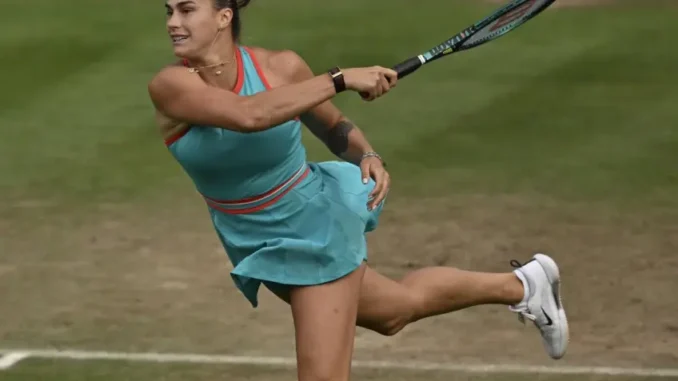
The Berlin Open’s Steffi Graf Stadion erupted in a whirlwind of tension and tenacity as world No. 1 Aryna Sabalenka battled past Swiss qualifier Rebeka Masarova in a gripping second-round clash, securing a 6-2, 7-6(6) victory to reach the quarter-finals on June 19, 2025. The match, marred by a controversial suspension due to slippery court conditions, showcased Sabalenka’s fiery spirit and resilience, as she overcame both her opponent and a heated dispute that threatened to derail her grass-court campaign. With Wimbledon looming, this dramatic win signals the Belarusian’s intent to conquer the grass and reclaim her momentum after a heart-wrenching French Open final loss.
Sabalenka, playing her first match since falling to Coco Gauff in a three-set Roland Garros thriller, entered Berlin as the top seed, eager to translate her powerful game to the slick grass courts. Against Masarova, ranked No. 112, she dominated early, storming to a 6-2 first-set lead with her trademark aggression, firing 14 winners and saving all six break points. Yet, as sunset descended on Wednesday, the match took a contentious turn. Masarova, trailing and visibly struggling, complained about the court’s slipperiness due to rising humidity and dew, prompting officials to halt play despite Sabalenka’s protests. “You are stopping the match because she says that side is slippery? I just played two games on that side,” Sabalenka exclaimed, her frustration boiling over as she accused Masarova of stalling to escape defeat. “She’s just losing the match.”
The suspension, following a marathon three-hour match between Liudmila Samsonova and Jessica Pegula earlier that evening, pushed Sabalenka’s contest into Thursday. Former US Open champion Andy Roddick weighed in, questioning Masarova’s motives and suggesting her complaints were a tactical ploy to disrupt Sabalenka’s rhythm. “Masarova’s actions could have consequences for the tournament’s flow,” Roddick noted, while CoCo Vandeweghe called the situation “unusual,” highlighting the rare advantage given to a trailing player. Sabalenka, known for her emotional intensity, later reflected on the dispute, maintaining her belief that Masarova’s concerns were strategic. “I was dominating, and suddenly the match stops because of her complaint,” she said post-match, her tone laced with defiance.
When play resumed, Masarova mounted a spirited comeback, breaking Sabalenka early to lead 3-1 and 4-2 in the second set. The Swiss qualifier, who had upset former Australian Open champion Sofia Kenin in the first round, pushed Sabalenka to the brink, forcing a tiebreak. Sabalenka, however, regained her composure, unleashing a fine volley to break back and showcasing her break-point-saving prowess—neutralizing 10 of 12 across the match. In the tiebreak, she sealed victory with a blistering forehand, advancing to face either Elena Rybakina or Katerina Siniakova in the quarter-finals. “I stayed aggressive and kept her guessing,” Sabalenka said, crediting her tactical variety for the win. “Those little moments of pressure helped me close it out.”
The drama in Berlin follows Sabalenka’s turbulent French Open campaign, where her 70 unforced errors against Gauff led to a tearful admission: “It was the worst final I’ve ever played.” Her subsequent apology to Gauff for attributing the loss to her own errors rather than Gauff’s brilliance showed a reflective side, but Berlin’s fiery exchange revealed the fierce competitor within. With three major titles—2023 and 2024 Australian Opens and 2024 US Open—and a 41-6 record in 2025, Sabalenka remains a Wimbledon favorite, as pundits like Andy Roddick and Tracy Austin predict her powerful serve and aggressive baseline play will thrive on grass. “Sabalenka’s game is built for Wimbledon,” Austin said, noting her potential to reach her first final at SW19.
The Berlin Open, a WTA 500 event, has been a cauldron of surprises, with Ons Jabeur’s 6-1, 6-3 rout of world No. 5 Jasmine Paolini and Paula Badosa’s upset of Emma Navarro adding to the chaos. Sabalenka’s path to the title, potentially including a rematch with Gauff, promises more fireworks. As she navigates the grass-court swing, her ability to channel controversy into motivation will be key. “I’ll come back stronger,” she vowed after Paris, and her Berlin triumph—forged in the heat of adversity—proves she’s ready to roar on the grass.
Leave a Reply